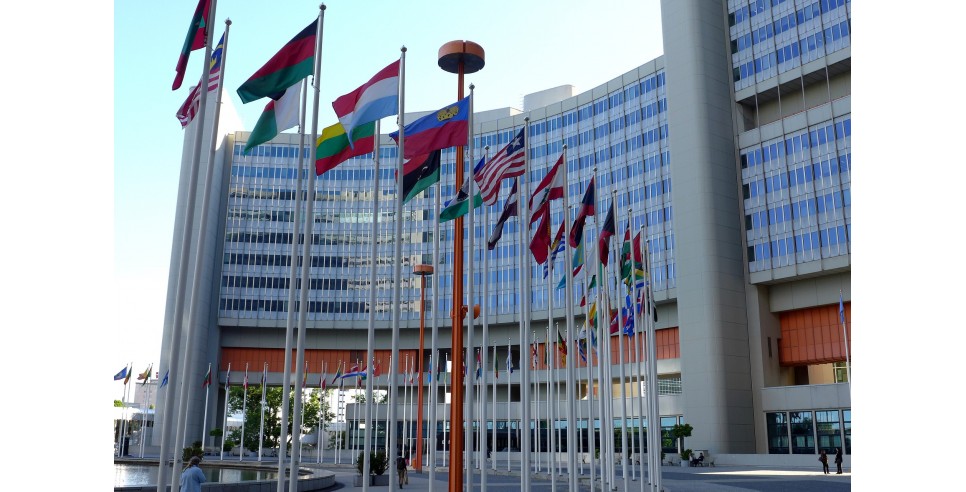
The alarming news from an international team of scientists who have spent more than a year documenting what is happening to the climate in the Arctic, coupled with equally disturbing climate news from Antarctica and the many other indicators, tells us definitively that the Earth’s climate is drastically changing -- much faster than previously thought. Only a concerted international effort – starting now – stands a chance of mitigating this threat before it becomes a catastrophe.
A broad cooperative response, backed by major financial resources and relying on a combination of local citizen efforts, responsible stakeholder capitalism and government at all levels, including new U.N. agencies that are oriented to serving the common good rather than relying exclusively on capitalist “market solutions,” is the only sure way to avoid a war of “each against all.” As the billionaire Microsoft founder and philanthropist Bill Gates once put it in a TV interview, “markets only work for people who have money.”
In the current political climate of resurgent nationalism and, very often, antagonistic relationships between nations, as well as skepticism about the shortcomings of the United Nations and even the very idea of adding more government, I would propose a two-step approach. At the start, there could be a strictly voluntary mutual aid agreement along, the lines of the 2015 Paris climate accord and the 2021 Glasgow update, that would assemble a pool of donated financial resources earmarked for assisting with major climate related crises. This might be administered by an existing U.N. agency or perhaps a new single-focus agency under the general authority of the U.N., and it would support and coordinate closely with other U.N. agencies and the various NGOs that are tasked with convergent missions and are even now ramping up new capabilities for dealing with climate emergencies.
However, our ultimate response must be far more ambitious and comprehensive, I believe. Because we are now facing massive and prolonged environmental challenges that most countries cannot cope with alone (especially if they start preparing for them only after the disaster has occurred), we must act collectively to build a sustainable global superorganism – or else. Ideally, we should mobilize the needed resources, management systems, organizational capabilities, and trained workers before these crises occur, and we must have an “all-hands-man-your-battle-stations” response when they do.
The idea of “world government” (a global superorganism) is, of course, hardly new. It is an enduring dream that can be traced back at least to Bronze Age Egypt and the ancient Chinese Emperors. In the modern era, it has been espoused by a great many prominent people, from Immanuel Kant to Albert Einstein, Winston Churchill, and Martin Luther King. Both the League of Nations and the United Nations, despite their limitations, were incremental steps in this direction. In the years after World War Two, the World Federalist Movement championed a more inclusive and powerful global regime. However, in recent decades the traditional idea of a top-down world government has largely been replaced by the more complex, polycentric, democratic vision of “global governance” – a global system of limited self-governing regimes and cooperative action with respect to specific transnational problems and domains, rather than an overarching, unified, all-powerful political authority.
A significant degree of global governance of this nature has already evolved piecemeal over time in various specialized areas – international law, the law of the sea, international aviation, world trade, and more. There are also various academic institutes and a large body of research and publications devoted to this subject these days, as well as a political globalization movement that includes such prominent theorists as Hazel Henderson, Fritjof Capra, Elisabet Sahtouris, Peter Russell, Herman Daly, Alvin and Heidi Toffler, Barbara Marx Hubbard, and others. But what has long been an aspiration has now become an imperative. As a recent review concluded: “Among different fields of global governance, environmental management is the most wanting in urgent answers to the crisis in the form of collective action by the whole human community…” I believe we need both expanded global governance with respect to climate change and other urgent environmental and health problems and an enhanced role for world government.
Here is what this regime might look like. I call it a Global Governance Initiative. It is grounded in the belief that there must be a major change in the dynamics of global politics and in the relationships between nations. A significant course change will be needed to meet our growing crisis. Our global system of deeply competitive nation states must shift gears and become much more cooperative, in order to deal with this overarching challenge. The competition, conflicts of interest, and sometimes bitter animosities that now exist between various countries must be subordinated to a collective mission with shared benefits and costs. New financial resources and new organizational capabilities will also be required to stand up to these hurricane-force headwinds. Only if we have an all-out cooperative effort, I believe, will we be able to cope with the furies that we are facing.









